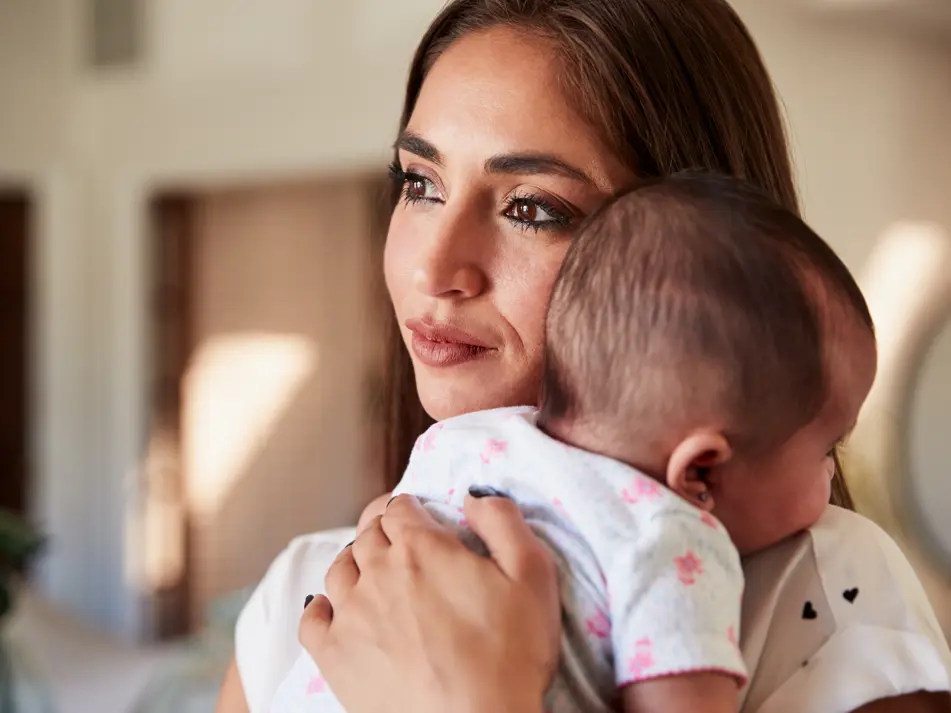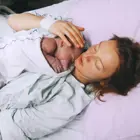Postnatal Depression

On this page
- What is Postnatal Depression?
- I’ve just had a baby. Shouldn’t I be happy?
- What are some symptoms of postnatal depression and/or anxiety?
- Other postnatal depression symptoms
- What's the baby blues?
- Can postnatal depression be treated?
- What are some ways to care for yourself?
- If I get more sleep, will I get better without help?
- Does my postnatal depression affect my baby?
- I’m feeling angry with my baby
- Where can you get postnatal depression support?
- How does Tresillian help parents experiencing mental health issues?
- FAQs about postnatal depression and/or anxiety
After the birth of a baby, you need to care for yourself both emotionally and physically. While some days will be better than others, it's important to recognise the signs of postnatal depression and/or postnatal anxiety so you can get some help.
What is Postnatal Depression?
Pregnancy and the first year of parenthood is a unique and special time. It’s also a time of great change.
All parents will have good days and bad days. But when the bad days outnumber the good, there may be a risk.
Perinatal depression and anxiety is a medical condition that is diagnosed when a parent experiences strong emotions that impede their ability to function in their usual way. Perinatal means anytime during pregnancy or the year after birth.
Perinatal anxiety and depression affects:
- 1 in 5 mothers
- 1 in 10 fathers
It leaves 100,000 Australians each year with feelings of low mood and lack of enjoyment in life.
Postnatal depression affects everyone differently, depending on your own individual circumstances. Symptoms can be mild, or moderate to severe. Sometimes people experiencing postnatal depression think about dying or not wanting to be here anymore. This is part of the illness and can be treated.
If you or someone you are supporting is experiencing low mood, having trouble concentrating, not interested in things and lacking energy, you – or they – might have postnatal depression.
I’ve just had a baby. Shouldn’t I be happy?
Postnatal depression can happen to anyone and there are many reasons, here are just a few:
- There have been changes to your blood “chemistry”. Things like iron, hormones and vitamins that are usually more stable have changed a lot during pregnancy and after the birth. You should have a check-up with your health professional to make sure there is no other cause for the symptoms you are experiencing.
- There might be a family history of depression, and this can make you more vulnerable to experiencing depression also.
- If you have had depression in the past, you are more likely to experience it again.
- It can be daunting to become a parent and have new responsibilities. There are many changes to your life when you have a baby and only after the baby arrives do new parents fully realise the changes. It’s natural to experience a period of adjustment for both parents.
Postnatal depression is an illness, just like having a cold. You don’t have control over catching a cold and you didn’t choose to experience postnatal depression. You can love and want your baby and have postnatal depression.
What are some symptoms of postnatal depression and/or anxiety?
-
1
Depressed mood: you might feel sad, empty, numb or hopeless and - the most surprising one – sometimes people are irritable or easily frustrated. Others might notice that you’re teary or “touchy”, reacting with strong emotions to things that normally wouldn’t bother you. If these feelings are present most of the day, nearly every day, you might be experiencing depression.
-
2
Loss of interest or pleasure: you’re not interested in, or enjoying, all activities most of the day and nearly every day. Now that you’re a parent, it might be hard to find the time for many of the activities you previously enjoyed with a little person to care for, but you would generally expect to maintain interest in those activities and hopefully also to enjoy your new role as a parent. If nothing “sparks joy”, you might be experiencing depression.
-
3
Highly restless or sluggish: Feeling either highly restless or fidgety or the opposite such as having difficulty getting moving or being clumsy and uncoordinated. Being unable to sit still, or dashing about without purposeful movement; pacing; tapping fingers; and abruptly starting and stopping tasks, or feeling sluggish and having difficulty with tasks requiring hand-eye coordination, and/or reacting to situations slowly, can be signs of depression.
-
4
Feeling worthless or guilty over things that aren’t in your control nearly every day can also be a sign of depression. It’s normal to feel guilt sometimes about things we might have done but if you are consumed with guilty thoughts, blaming yourself for things that were not in your control and feeling useless or worthless, you might be depressed.
-
5
Experiencing decreased concentration nearly every day which can cause indecisiveness, or difficulty focusing on a task and seeing it through to completion can be a sign of depression. Some people notice they cannot follow the story line of movies or TV shows and struggle to engage in conversations and they might often feel overwhelmed.
-
6
Thoughts about suicide or not wanting to be here anymore are also a sign of depression. Many people find these thoughts distressing and unwanted, and much like a cold or flu, they are a sign of being unwell and can be treated. If you have these thoughts, even if you don’t have any of the other symptoms, you should speak to a health professional as soon as possible to access some support.
Other postnatal depression symptoms
The next three symptoms are a little harder to assess in a new (or expecting) parent, you’ll see why as you read below:
- Changes to your sleep: such as difficulty falling asleep, frequent waking or sleeping too much. It’s to be expected in the early stages of parenthood that you might not be getting much sleep. However, if you are unable to sleep even when your baby is sleeping, or you are sleeping a lot more than you usually do and find it hard to get out of bed, you might be experiencing depression. Some people find that their mind is busy, and they struggle to fall asleep due to worrying about things. Others find they fall asleep but wake frequently, with lots of thoughts or anxious feelings. The thoughts and feelings accompanying the lack of sleep are the clue that this could be depression, rather than simply being sleep changes due to new parenthood.
- Fatigue or loss of energy: like the symptoms about sleep changes, it is to be expected that you might be more tired than usual now that you are a parent. However, if you feel exhausted and tired out for no good reason, most of the day, nearly every day (even if you did get a good night’s sleep) you might be experiencing depression.
- Weight loss or gain: of course, the birth parent has experienced both weight gain and loss due to pregnancy and giving birth. Breastfeeding also results in weight fluctuations. Sometimes when people are depressed, their appetite changes: they can sometimes feel nauseous and disinterested in food, or they find themselves eating a lot more, as a form of comfort. If you notice that you’re not interested in food, or the thought of eating makes you feel nauseous, or you’re binge-eating, this might be a sign of depression.
What's the baby blues?
The baby blues occur during the first week after a baby’s birth and last for a few days. It generally clears up after a few days with no treatment except support and understanding.
If you continue to feel the baby blues for longer than two weeks, you might be suffering from postnatal depression and/or anxiety.
Can postnatal depression be treated?
There are many treatment options for postnatal depression and anxiety. Some include psychological and counselling support (either individual or in a group), online support tools and in some cases medication. These can all make a huge difference.
It's also important that you take care of yourself.
What are some ways to care for yourself?
-
Exercise can improve your physical and mental wellbeing.
-
Try to limit the amount of work you do around the home.
-
Ask for help if you need it.
-
Try to rest when your baby rests.
-
Eat a healthy, well balanced diet.
-
Be efficient when cooking and make extra meals that can be frozen for when you're feeling too tired to prepare a meal.
-
Develop a support network with other new parents by joining a new parent group (these are usually held at your local Child and Family Health Clinic).
-
Avoid spending too much time on technology.
-
There are many blogs and parenting forums where you can read and share parenting experiences. However be cautious about accepting parenting advice from others.
-
If possible, arrange regular childcare by a relative, friend or occasional care.
-
Take care to avoid heavy lifting or placing strain on your back by twisting when lifting your baby or baby equipment.
-
Talk about your feelings or concerns to a friend, relative or Child and Family Health Nurse.
If I get more sleep, will I get better without help?
The answer to that question is as different as the people who have postnatal depression.
What we know is that early support is better than waiting and delaying the start of your recovery. If you can speak to your health professional early about how you are feeling, they can check for low iron and other reasons that you may be experiencing postnatal depression.
Your medical professional can ask you some brief questions to see if you have mild, moderate or severe symptoms. Moderate to severe symptoms will benefit from some intervention, such as seeing a counsellor and/or considering some medication to help speed up the process of recovery.
Mild symptoms most often improve by speaking to a counsellor. The sooner you seek help, the sooner you will start feeling better. A mental health professional can also help you recognise the signs that you were becoming depressed and find ways to improve your overall mental wellbeing to stay well.
Does my postnatal depression affect my baby?
The good news is that postnatal depression can be treated and have you back on the path to enjoying parenthood and delighting in your baby.
Research has shown that your baby’s first 2000 days of life – up until five years of age and including the time in utero - is a time of huge growth and development with 90% of your child’s brain growing during this time.
A high quality, strong emotional attachment with you has a positive impact on your child’s mental health, and their physical and social development.
Parental depression can interfere with your ability to develop a strong, healthy attachment with your child. However, identifying early that you’re struggling and seeking help allows you to receive the care and treatment you need to return to health and focus on your child during those first 2000 days.
Babies and young children delight in your attention, such as when you are talking to them, playing, and giving cuddles. These interactions support your baby to learn about their emotions and relationships to give them the best possible start in life.
I’m feeling angry with my baby
-
1
If you're feeling angry with your baby, make sure they're out of harm's way in their cot or bassinette. This is one time that it’s okay to let them cry. Never shake your baby as it can cause brain damage.
-
2
Go into another room and take some deep breaths and make a cup of tea or have a glass of water.
-
3
Call a friend or a support service such as the Tresillian’s Parent Help Line or the support services below. It will help you to talk through your feelings with someone supportive.
-
4
Go outside for a walk or run. If there’s no one to look after the baby, take your baby with you in the pram.
Where can you get postnatal depression support?
There is plenty of support out there for you and your family.
For urgent help, contact:
- The Perinatal Anxiety & Depression Australia (PANDA) on 1300 726 306
- Lifeline on 13 11 14
- 13YARN Aboriginal and Torres Strait Islander support on 13 92 76
Some of these organisations have postnatal depression support groups where you can connect with other people on a similar journey.
- Call the Tresillian Parent's Help Line on 1300 272 736
- SMS4Dads
- Australasian Birth Trauma Association
- Centre of Perinatal Excellence (COPE)
- Peachtree Perinatal Wellness
- Rainbow Families
- Pink Elephants Support Network
How does Tresillian help parents experiencing mental health issues?
Tresillian can provide free confidential mental health assessment and support for parents with infants and children 0 – 5 who access Tresillian services in metro Sydney, Canberra and regional sites across NSW and in northern Victoria. When seeking Tresillian support, please feel confident to reach out to staff if there are feelings of distress or anxiety, or if it feels difficult to connect with your infant or child. Tresillian staff can provide one on one support via Day, Residential and Virtual services, but also Tresillian has a team of committed mental health practitioners to provide specialist support if needed.
The Perinatal, Infant and Early Childhood mental health team includes psychologists, psychiatrists, social workers, psychiatrists in training, occupational therapists and clinical nurse consultants and provides multidisciplinary, wrap around support to meet your needs. The team will assist you to manage your emotional health, and provide a safe reflective space to ensure a positive, secure relationship is developing between you and your infant. Tresillian also offers groups to support your emotional wellbeing. Tresillian’s Vision is that ‘Every Child has the best possible start in life’ and we understand the profound effects of mental health on parental and child wellbeing and flourishing – ‘It’s in our nature to nurture.’
FAQs about postnatal depression and/or anxiety
If you have a friend or family member with postnatal depression, the best way you can help them is by being a supportive person in their life. Offer to cook meals, mind their baby so they can have time to themselves and be there to listen when they need to talk.
Postnatal depression can start anytime in the first year after birth.
Perinatal means anytime during pregnancy or the year after birth. Postnatal is the 12 months after birth.
You might ask them to read this page and the link below to more detail about the symptoms of postnatal depression. You could also invite your support person to part of a session with your mental health professional to help them understand your experience and work on ways they can support you to get better.
Tresillian can provide free confidential mental health assessment and support for parents with infants and children 0 – 5 who access Tresillian services in metro Sydney, Canberra and regional sites across NSW and in northern Victoria. When seeking Tresillian support, please feel confident to reach out to staff if there are feelings of distress or anxiety, or if it feels difficult to connect with your infant or child. Tresillian staff can provide one on one support via Day, Residential and Virtual services, but also Tresillian has a team of committed mental health practitioners to provide specialist support if needed.
The Perinatal, Infant and Early Childhood mental health team includes psychologists, psychiatrists, social workers, psychiatrists in training, occupational therapists and clinical nurse consultants and provides multidisciplinary, wrap around support to meet your needs. The team will assist you to manage your emotional health, and provide a safe reflective space to ensure a positive, secure relationship is developing between you and your infant. Tresillian also offers groups to support your emotional wellbeing. Tresillian’s Vision is that ‘Every Child has the best possible start in life’ and we understand the profound effects of mental health on parental and child wellbeing and flourishing – ‘It’s in our nature to nurture.’











































